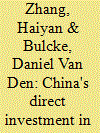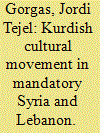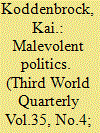| Srl | Item |
| 1 |
ID:
129645


|
|
|
|
|
| Publication |
2014.
|
| Summary/Abstract |
While China is fast becoming an important outward direct investor, its companies are showing an increasing interest to locate in Europe and the European Union (EU). It has been suggested that this can partly be explained by the more lenient attitude of the European countries compared to the US, where some acquisitions were abandoned when they ran into political opposition based on security concerns. Yet, also in Europe, the media follow rather closely each new Chinese entry, and certain politicians have started to criticise the take-over of technology-oriented companies, especially by Chinese state-owned firms. Against the background of a very open foreign direct investment (FDI) policy as measured by OECD FDI Restrictiveness Index for the EU and the individual countries, an overview is given of the pre- and post-establishment obstacles to direct foreign investment. Also, the EU policy measures that directly or indirectly deal with incoming direct investment are discussed. Within the context of the EU competition policy and the merger regulation, the EU Commission has cleared five cases of take-over by Chinese state-owned enterprises. Although the Lisbon Treaty authorises the EU Commission to take charge of investment policy as part of the EU commercial policy, it will take time to realise this. If the announced negotiations about an investment treaty between China and the EU could work out the necessary balance, it would be an important step in achieving more reciprocity between their respective investment regimes.
|
|
|
|
|
|
|
|
|
|
|
|
|
|
|
|
| 2 |
ID:
133824


|
|
|
|
|
| Publication |
2014.
|
| Summary/Abstract |
In the late nineteenth and early twentieth centuries diverse, and sometimes competing, movements of cultural renaissance emerged in the Middle East. Within this context, the Kurdish cultural renaissance in the Kurmanji dialect appeared relatively late and moreover its fruits were curtailed by two major events: the First World War and the establishment of the Turkish republic. From 1923 onwards, the task of animating the Kurdish cultural renaissance fell on the Kurds exiled first in mandatory Syria and Lebanon and then in Europe. In exile, Kurdish intellectuals benefited from some advantageous conditions such as freedom of speech and organization. Yet Kurdish intellectual endeavors in the Levant were to face political, social and economic challenges. Using French records and Kurdish newspapers, this article explores both the opportunities and the constraints for the consolidation of the Kurdish cultural renaissance under colonial rule. In doing so, the article intends to enrich the debate on the formation of nationalisms in the interwar era on the one hand, and the relationship between colonial powers and minorities in the Middle East, on the other.
|
|
|
|
|
|
|
|
|
|
|
|
|
|
|
|
| 3 |
ID:
133262


|
|
|
|
|
| Publication |
2014.
|
| Summary/Abstract |
Since the start of reporting during the 'Congo wars' in 1998 the International Crisis Group (icg) has been one of the most important sources of information for Western analysts, UN agencies and ngos dealing with the political and economic challenges of the Democratic Republic of Congo. This article takes a closer look at the way Congolese government politics is analysed in icg reports. It shows that the logics of government and the dilemmas of rule in a country with the size, geography and history of the DRC receive hardly any attention in icg reporting. Building on Klaus Schlichte's approach to the dilemmas of rule, the article argues that President Joseph Kabila has in fact responded skilfully to the dilemmas of elite inclusion across the different hubs of power and wealth from the Kivus to Katanga to the capital Kinshasa. While his political and human rights records are by no means impeccable, not all is rotten in the state of Congo, and the Kabila government deserves more analytical rigor and openness than is offered by the pathologising modes of analysis used by the icg.
|
|
|
|
|
|
|
|
|
|
|
|
|
|
|
|
| 4 |
ID:
051839


|
|
|